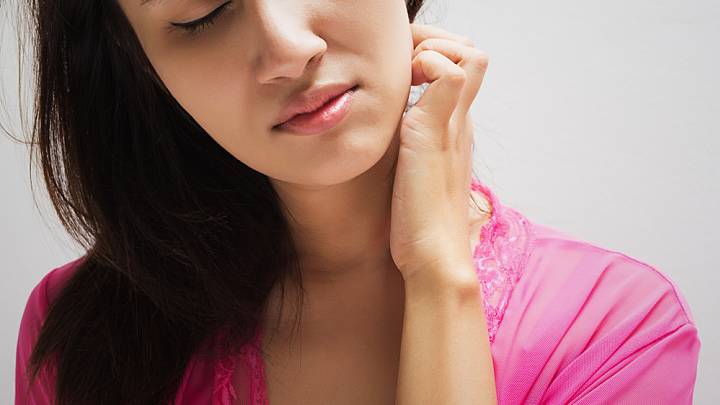What Causes Eczema?

Medically reviewed by
Dr Kathryn BasfordLast reviewed: 06 Mar 2019
Where do different types of eczema come from?

The name ‘eczema’ includes a group of skin conditions that show up as dry and irritated skin. It is not a dangerous condition, but if not managed properly it can spread and become more severe, or even infected.
Eczema can come back again and again during periods of time called ‘flare-ups’. This page will explain the causes of different types of eczema, and some tips on how to handle them and prevent flare-ups.
What causes eczema in the first place?
There is not one single cause of eczema, but some things can trigger eczema and its flare ups. The reaction can be caused by:
- an irritant: a substance which causes damage to the skin directly
- an allergen: a substance that causes an immune reaction that shows up on the skin as eczema symptoms
Using certain soaps, detergents, or spending a lot of time with wet skin are some of the most common causes.
It’s not clear why some people get eczema and some people don’t. There seems to be a genetic link and if your family members have eczema, asthma, or allergies, you are more likely to get eczema yourself.
What causes eczema flare-ups?
There are a few different causes of eczema flare-ups:
- dry skin: when dry, skin loses its protective barrier and can easily become brittle, scaly, and rough, and then more prone to a flare-up
- irritants: these can be any man-made products (cleaning, fragrance etc) you use for your body or your house, and also natural produce like fresh fruit, vegetables, or meats
- cigarette smoke
- emotional stress
What are the causes of different types of eczema?
The two most common forms of eczema are atopic eczema, and contact eczema
Atopic eczema:
- usually begins in childhood, and may go away again on its own or may continue to flare up in adulthood
- can appear anywhere on your body
- causes are not exactly known, but genetics seems to play a part because the condition runs in families. A genetic mutation of the protein filaggrin, which is responsible for your skin’s natural barrier, is often found in people with eczema. Environmental factors are also involved because the immune reaction that causes atopic eczema is caused by allergens in the environment
Contact eczema (or contact dermatitis):
- is more common in adults
- affects mostly hands and face, since these are the parts of our body that most often get in touch with potential irritants and allergens
- also affects the eyelids (called eyelid dermatitis). The eyelid is a thin layer of skin with many blood vessels and very little fat. This setup makes it more likely to get irritation and allergic reactions. Make up, eye cream, contact lenses, eye drops, and pollen are among its major causes
- causes include irritants or allergens that come into contact with your skin. The most common ones are: soaps, detergents, perfumes, acidic food, tobacco smoke, industrial chemicals, and bleach
Other forms of eczema include discoid, varicose, seborrhoeic, and dyshidrotic.
Discoid (or nummular) eczema:
- happens at any age
- can cause round spots anywhere on your body
- is caused by insect bites, reactions to skin inflammation, and dry skin in winter
Varicose (or stasis) eczema:
- happens for people with vascular (blood vessel) conditions
- usually affects the lower legs
- is caused by reduced blood flow in the veins, which leads to increased pressure. Fluid then leaks out of the veins and builds up under the skin
Seborrhoeic eczema:
- can happen at any age, but is more common in men than in women
- usually affects areas of the body that have many oil-producing glands, like the upper back, nose, and scalp. On the scalp it can cause scales that go from white and dry to yellow and greasy
- is not caused by allergies, but probably has genetic and hormonal causes related to the production of sebum (oil) by the skin. People with conditions that affect the immune system are more likely to get it
Dyshidrotic (or pompholyx) eczema:
- is twice as common in women than in men
- causes small, itchy blisters on the fingers, toes, palms, and soles of the feet
- is caused by stress allergies like hay fever, moist hands and feet, and coming into contact with substances such as nickel, cobalt, chromium salt
What causes eczema spots?
As mentioned above eczema spots can have different causes depending on the type of eczema.
In particular, the circular patches seen in discoid eczema can result from particularly dry skin, insect bites, or burns. Discoid eczema spots can also be a side effect from using medications to treat hepatitis C (interferon), arthritis (TNF-alpha blocker) and high cholesterol (statins).
For other types of eczema exposure to allergens and irritants are among the main causes, together with a genetic predisposition.
Typical eczema spots can be confused with other skin conditions, like psoriasis, which shows up as dry, scaly spots on the skin. Treatments for psoriasis are available to order from ZAVA.
Is eczema caused by an infection?
Eczema can have many causes, but infection is not a main cause. But an infection might add to the extent of eczema symptoms during flare ups. This can include infections due to bacteria, viruses, or fungi, like thrush.
If you scratch skin affected by eczema too often or too violently, your skin can develop an infection. This happens because a bacterium called Staphylococcus Aureus, which usually lives harmlessly on the surface of your skin, can get into the skin barrier holes caused by your eczema. If you are having one of the following, you might have developed a skin infection and should see your doctor as soon as possible:
- severe itching
- burning sensation
- blistering of the skin
- fluid drainage
- yellow or white pus
Another inflammatory condition that can be a result of eczema is called ‘eczema herpeticum’. If you don’t manage it properly, atopic eczema can create the perfect environment for the herpes virus to infect a large area of the skin. Eczema herpeticum is a serious condition which, especially in children, can lead to wider infection and even death. If your child shows these symptoms you should get medical help right away.
Your skin might also be affected by another inflammatory condition called acne. Acne and eczema have a few things in common, because they can both happen at any age and flare up, disappear, and then come back again. A doctor will help you tell the difference between the two and find the right treatment. Treatments for acne and eczema can easily be ordered online.
Can you get rid of the causes of eczema?
Together with your doctor or nurse, you can try to figure out what factors in your environment might be triggering your eczema, or making it worse. If you wish to self assess possible triggers, this trigger-chart might help you out.
For example, you might notice that your eczema gets worse when you wear clothes with certain fabrics, or when you use a certain soap or perfume, or in the winter more than in summer. You can also talk to your doctor about the type of work you do or your home environment, including any pets or regular contact with cigarette smoke. Hobbies and sports can also be linked to the causes of your eczema, like the chlorine and bromine present in swimming pools, which can act as triggers.
Once you have identified your triggers you can try to avoid them completely, or at least reduce their effect. For example, as well as being a major threat to your health, smoking is also a possible trigger for eczema. If you wish to quit smoking, you can use nicotine replacement products or quit smoking tablets, available from ZAVA.
Since the causes are not only related to your environment, but also to your genes and immune system, it may be that you won’t be able to eliminate all the triggers affecting your eczema. In this case you can still use emollients and medications to treat your eczema.
Does stress cause eczema?
The relationship between stress and eczema has to do with the way our bodies react to stress. When we are faced with a stressful situation our bodies produce more stress hormones, like adrenaline and cortisol. When produced in large amounts, cortisol can suppress the activity of our immune system and this can lead to a stronger inflammatory response in the skin, making flare ups more likely.
But, stress is more likely to be a cofactor, and not the main cause of eczema and its flare ups. This means stress might make flare ups stronger, or more likely, but won’t cause the eczema or flare ups directly.
Relaxation techniques and psychological support can reduce stress and may, in some cases, improve the flare-ups, but probably won’t sort them out completely.
Together with stress, lack of sleep can make your eczema worse. If your eczema is already bad enough that it keeps you up at night, then you could be trapped in a circle of insomnia (lack of sleep) and eczema. The same is also true for stress. If this is the case, it’s important to get the help of a qualified health provider to help you get better.

from £29.99

No results found.
Please check your spelling or try another treatment name.

Dr Kathryn Basford is a qualified GP who works as a GP in London, as well as with ZAVA. She graduated from the University of Manchester and completed her GP training through Whipps Cross Hospital in London.
Meet our doctorsLast reviewed: 06 Mar 2019
-
Eczema Society of Canada. Eczema is… [online] Available at: https://eczemahelp.ca/about-eczema/ [accessed 26th February 2019].
-
Liaw, F. Y. et al (2012). Eczema herpeticum: a medical emergency. Can Fam Physician, Dec; 58(12): 1358-1361. [online] Available at: https://pubmed.ncbi.nlm.nih.gov/23242894/ [accessed 13th May 2021]
-
National Eczema Association. An overview of different types of eczema. [online] Available at: https://nationaleczema.org/eczema/types-of-eczema/ [accessed 24th February 2019].
-
National Eczema Association. Eczema and emotional wellness. [online] Available at: https://nationaleczema.org/eczema-emotional-wellness/ [accessed 26th February 2019].
-
National Eczema Association. Eczema causes and triggers. [online] Available at: https://nationaleczema.org/eczema/causes-and-triggers-of-eczema/ [accessed 24th February 2019].








